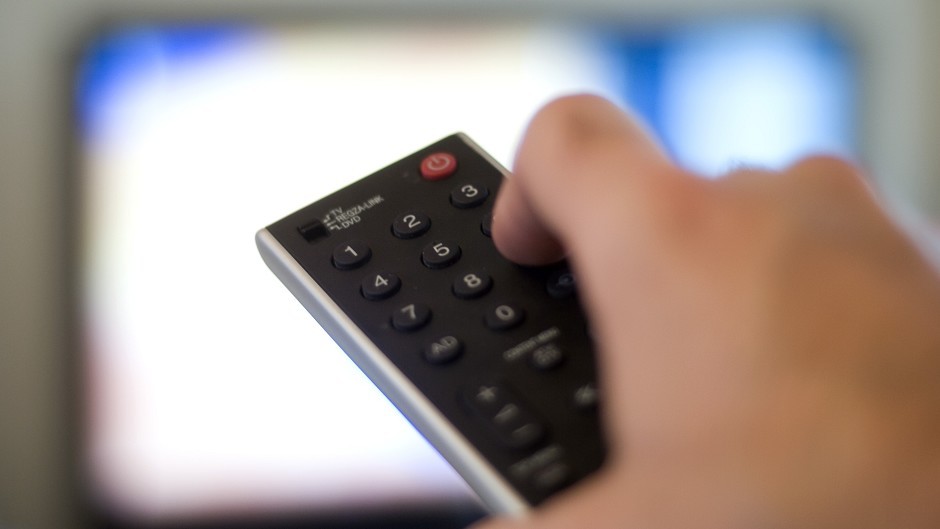It’s official. I am now a pensioner, which means that should I be stupid enough to commit a crime or unfortunate enough to be involved in an accident, newspapers will refer to me as “elderly”.
This depressing landmark has its benefits, however, in that the government now pays me a wage.
Granted, it is not a huge wage and certainly not enough to sustain a hedonistic lifestyle, but it is a wage.
The other benefit is that I am allowed, or rather expected, to be grumpy. Some would say I’ve been exercising that right for years, but now I can do so guilt-free. So here goes.
Is it just me, or is day-time television really mind-bogglingly dreadful? On the days the Scottish weather keeps me off the golf course, daytime TV serves to remind me of what I’m missing.
It may be an urban myth, but it is said that Elvis Presley used to keep a gun at his side while watching TV in case the actor and karate instructor Mike Stone, who had an affair with Elvis’s wife, appeared on screen, at which point a shot would ring out and Curry’s would have to deliver a new set.
If it is true, I know exactly how he felt because the same rage burns inside me when I watch Homes Under the Hammer.
The production company or the BBC (which I dislike with a passion, incidentally) must employ someone whose sole function is to write cringe-inducing puns, which are then trotted out, without a hint of embarrassment, by presenter Martin Roberts, presumably to draw attention away from the fact that he selects his clothes from a skip.
Not content with that, every observation is then accompanied by music, which is supposed to be wittily appropriate, but instead simply adds to the torture.
How on earth Dion Dublin, a wonderful footballer and genuinely nice guy, got mixed up with this crock of unpleasant stuff is beyond me. He can’t need the money, surely, and he certainly can’t be proud of what he’s now doing.
And it gets worse. Just as the prospect of lunch lightens the mood, along comes Bargain Hunt, a programme devised, presumably, to demonstrate that the BBC really is devoid of creative flair. If you have not sampled this televisual atrocity, it basically puts two couples into garish fleeces, gives them £300 each and then asks them to buy the most ridiculous items they can find at a glorified car boot sale.
Said items are then auctioned, almost always for less than the contestants paid for them, and the money lost is just piled onto the TV licence fee. It really is dreadful, except when it is hosted by the lovely Christina Trevanion, who makes the suffering almost worthwhile.
Having negotiated the lunchtime news and the innocuous but meaningless soap, Doctors, the torture resumes with two more ultra-banal offerings, in the form of Money for Nothing and Make Me a Dealer.
Words cannot adequately describe just how bad these programmes are. Money for Nothing sees a group of strange presenters “rescuing” tat from a council dump and then paying more strange people vast sums of money to transform it into different-coloured tat which is then sold onto people who really should be forced to give power of attorney to someone with more sense. Believe me, it’s bad, although nowhere near as bad as Make Me a Dealer, in which the lightly-creosoted Paul Martin crawls from under his sun lamp and attempts to teach would-be antique dealers the tricks of the trade.
Now, I’m not a violent man, but I would never get tired of thumping Mr Martin, who must be one of the most supercilious, patronising characters ever to appear on screen.
Where does the BBC find these people? Sandwiched between these pathetic offerings, we are subjected to Escape to the Country, in which the presenters ferry househunters from one Devon property to another before announcing at the end that they decided to buy a house in Hull. Totally pointless, but it fills another hour.
Speaking of Pointless, it’s 5.15pm before the BBC produces anything remotely intellectually-challenging, this time in the form of one of the more ingenious quiz show formats, which also happens to feature two of the more engaging presenters, in the form of Alexander Armstrong and Richard Osman. It’s actually enjoyable viewing until you realise that you’ve seen the same episode three times.
In the old days, the BBC used to flag up programmes which were repeats. Now there’s so many of them that they don’t bother.
By now you must be wondering why on earth I watch all this drivel if I loathe it so much. If it’s any consolation, I’m wondering that, too. It must be an age thing.

